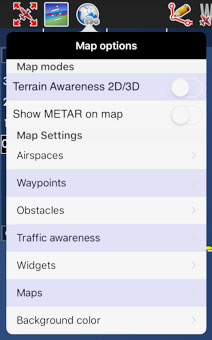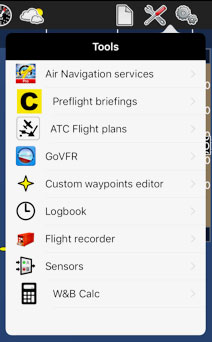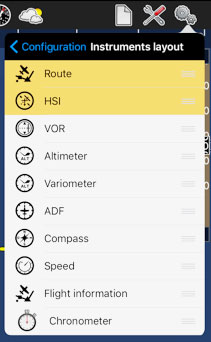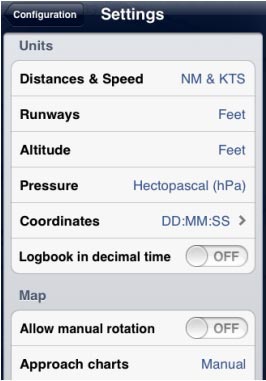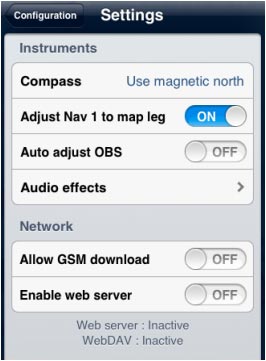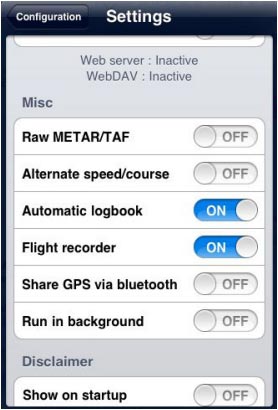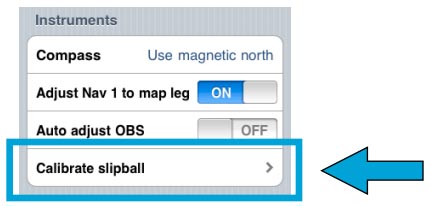(Created page with "Löscht die aktuell gewählte Route. Drücken Sie diesen Knopf, wenn Sie die Karte im Freiflug-Modus sehen möchten und/oder eine neue Route starten möchten. Darüber hinaus...") |
(Created page with "Zeigt die aktuellen Logbucheinträge an. Auf dem iPhone ist dieses Modul durch die Kartenreiter am unteren Bildschirmrand aufrufbar und sieht ein bisschen anders aus. ---- F...") |
||
| Line 49: | Line 49: | ||
[[File:tic_tac.jpg]] | [[File:tic_tac.jpg]] | ||
| − | + | Zeigt die aktuellen Logbucheinträge an. Auf dem iPhone ist dieses Modul durch die Kartenreiter am unteren Bildschirmrand aufrufbar und sieht ein bisschen anders aus. | |
---- | ---- | ||
[[File:upinthesky.jpg]] | [[File:upinthesky.jpg]] | ||
Revision as of 20:03, 1 December 2015
Auf dem iPad wechselt dieser Button zwischen einem geteilten Bildschirm und dem Vollbildmodus. Auf dem iPhone blendet dieser Button die Moving Map-Datenleiste ein und aus. Der geteilte Bildschirm zeigt zwei der ausgewählten Instrumente zusammen mit der Moving Map. Diese Instrumente/Route können unter „Instruments Layout“ über den «Configuration» Button in der oberen rechten Ecke der Symbolleiste ausgewählt werden. Für weitere Informationen verweisen wir auf das Konfiguration-Icon auf der nächsten Seite.
Erlaubt es, das EFIS-Modul zu starten. Zuerst müssen Sie die 3D Daten im "Map Store" downloaden. Auf dem iPhone finden Sie den Store in der Registerkarte unten rechts auf dem Bildschirm.
Anzeige der Karteneinstellungen. In den Karteneinstellungen können Sie die Karte konfigurieren und bestimmen welche Elemente wie dargestellt werden. Lesen Sie den Artikel «Map Options» für weitere Informationen. Die Optionen in diesem Menü sind:
- Anpassen der Helligkeit des Bildschirms;
- Anzeigen / ausblenden des Kartenhintergrunds (nur installierte Karten);
- Anzeigen / Ausblenden des Geländeprofils;
- Geländeinformation 3D/2D aktivieren / deaktivieren;
- Meteorologischen Bedingungen (VMC, IMC) durch Symbole auf der Karte anzeigen;
- Konfigurieren Sie den Filter des Luftraums;
- Konfigurieren Sie den Filter der Wegpunkte;
- Widgets aktivieren/deaktivieren;
- Aktivieren / Deaktivieren der einzelnen Karten und entscheiden Sie, welche Karte im Vordergrund angezeigt wird;
- Wahl der Kartenhintergrundfarbe (Wenn keine Karte installiert ist).
Wechselt zwischen dem Flug- und dem Editiermodus. Wenn der Editiermodus eingeschaltet ist, ist es möglich Wegpunkte auf der Karte hinzuzufügen und sie von aktuellen Routen zu entfernen. Es ist auch möglich einen weiteren Wegpunkt durch das Drücken auf einen Abschnitt des Vektors hinzuzufügen (Gummibandfunktion). Zudem können Sie in das EFIS-Modul frei navigieren.
Zeigt die Wegpunkt-Datenbank an um nach einem bestimmten Wegpunkt zu suchen oder führt Wegpunkte in der näheren Umgebung auf, welche nach Distanz sortiert werden.
Zeigt die Liste der gespeicherten Routen an. Durch Anklicken einer Route, wird diese als aktuelle Route eingestellt, zeigt die Flugabschnitte im Route-Modul an sowie die Route in der Moving Map als Magenta-Vektor.
Wählt den nächsten Landeplatz von Ihrer aktuellen Position aus und fügt ihn als direkten Wegpunkt ein.
Löscht die aktuell gewählte Route. Drücken Sie diesen Knopf, wenn Sie die Karte im Freiflug-Modus sehen möchten und/oder eine neue Route starten möchten. Darüber hinaus können Sie eine georeferenzierte Anflugkarte hinter der Moving Map verbergen.
Zeigt die aktuellen Logbucheinträge an. Auf dem iPhone ist dieses Modul durch die Kartenreiter am unteren Bildschirmrand aufrufbar und sieht ein bisschen anders aus.
Displays the «instruments» list. On iPhone/iPod Touch, the instruments list is reachable from the «Configuration» tab at the bottom right corner.
Displays a list of «weather stations» and latest METAR/TAF information in a decoded format. You can add stations of your choice by entering an identifier in the search field on top and press return. On iPhone/iPod touch, this module is reachable from the «Configuration» tab at the bottom right corner.
Displays a list of «PDF documents» associated to an airfield. Pressing a document will display its content in full-screen mode. You will also use this tool to create an «Aircraft profile». On iPhone/iPod Touch, this module is reachable from the «Configuration» tab at the bottom right corner.
Displays the «Tools» list where you can find additional utilities. On iPhone/iPod Touch, the tools are reachable from the «Configuration» tab at the bottom right corner. The following are the available options on this menu:
- Air Navigation Services. We refer you to «Xample Services» article in this manual;
- Preflight briefings. NOTAM service. Check «Preflight briefing» article.
- GoVFR tool. We refer you to «Third Party Services» article in this manual;
- Custom Waypoint Editor. You will be able to create user waypoints of different types (Airfield, Heliport, IFR, Navaids, etc);
- Logbook. We refer you to «Logbook» article in this manual;
- Recorded Flights. You can reproduce your flights live on this option. We refer you to «Record a Flight» article in this manual;
- Sensors. We refer you to «Sensors» article in this manual.
- W&B Calc. Weight and Balance calculator after entering the required data in the Aircraft profile.
Displays the «Settings» module where you can fine tune the application behavior and customize units and other settings. We can also find the «Map Store» module within this button, from where you can download both free and commercial maps/charts/data.
When using the Waypoints database search engine, you can enable/disable the countries displayed to make the search easier.This button also displays the «Instrument Layout» menu, where the instruments are reordered on top of the list in order to appear in the «split» screen when using an iPad. In this case, only the first two will show together with the moving map. On an iPhone/iPod Touch, the «Instruments Layout» menu will reorder the first 4 instruments to show them in the Bottom bar. All the mentioned modules and settings are reachable from the «Configuration» tab at the bottom right corner on an iPhone/iPod Touch.
The following «Settings» are available:
- Units. Gives the possibility to change the units of the displayed values:
- Distance & speed: NM&KTS, M&Mph, km&km/h; - Runway lengths: meters, feet; - Altitude: meters, feet; - Pressure (AHRS g mini): hPa, inHg; - Coordinates: DD:MM:SS, decimal, DD:MM.mm; - Logbook time: HH:MM, decimal.
If you wish to change Fuel/Length units, you can do this in the Aircraft profile panel.
- Map. Blocks/allows map rotation.
The option «Approach charts» allows us to choose how the geo-referenced approach charts will be open. Note that in order to use this option, you will first need to purchase the “VFR/IFR” approach charts from the Map Store (not all countries available). «TRK/Bearing» option will allow you choose from showing True North or Magnetic North when creating a Route/displaying next waypoint. When «Hidden points selectable» option is ON, the user can still select a waypoint if it's hidden.
- Instruments. You can choose from displaying the True/Magnetic North when using the Compass. When «Adjust Nav 1 to map leg» is ON, the instrument will automatically be configured to the NEXT waypoint on the map.
Remember that as it`s “Nav 1” it will only affect to the FIRST instrument of the list showing under «Instrument Layout» menu.
You can also choose to «Auto Adjust the OBS» when using the ADF, VOR and HSI. This will automatically align the arrow/CDI of the instrument in direction of the configured waypoint. Sound alerts can be activated from «Audio effects».
- Network. This will show, when enabled, the IP addresses to connect the Mac/PC with the «Embedded WebServer» or the «WebDAV server».
You also have the option for enabling «GSM download», when using 3G/4G network to download charts/data.
- Misc. The user can «RAW the METAR/TAF» information and also have the possibility to «run the app in the background» on the iPad, if having to temporarily use another app or change settings outside Air Navigation Pro. If Air Navigation remains in the background for more than 10 minutes, it will automatically close to save energy.
«Alternate speed/course» option forces Air Nav compute the data in “time deltas” and not continuously. This will help when the GPS signal is weak and breaks of intermittently.
The «Automatic logbook» option will complete the Block-OFF/Block-ON times and the Take-OFF/Landing times automatically. Please refer to the «Logbook» article more details. «Share GPS via Bluetooth» will let PAIR the device with another one of the same nature (for example an iPad with an iPod Touch) and share the GPS signal.
- Disclaimer. Disables the “Disclaimer” message at the start of the app.
- Default. Reverts to factory settings, WITHOUT deleting or modifying existing waypoints, routes, flights or logbook.
This last option might help in case Air Navigation Pro is not working properly.
- Spinball. This option will only appear in the «Settings» section of the iPhone/iPod Touch. There is not such a feature on an iPad.
To calibrate the spinball, you have to position your iPhone/iPod Touch on a flat surface. Note that only when flying aerobatics the spinball is spinning.
Back to index


